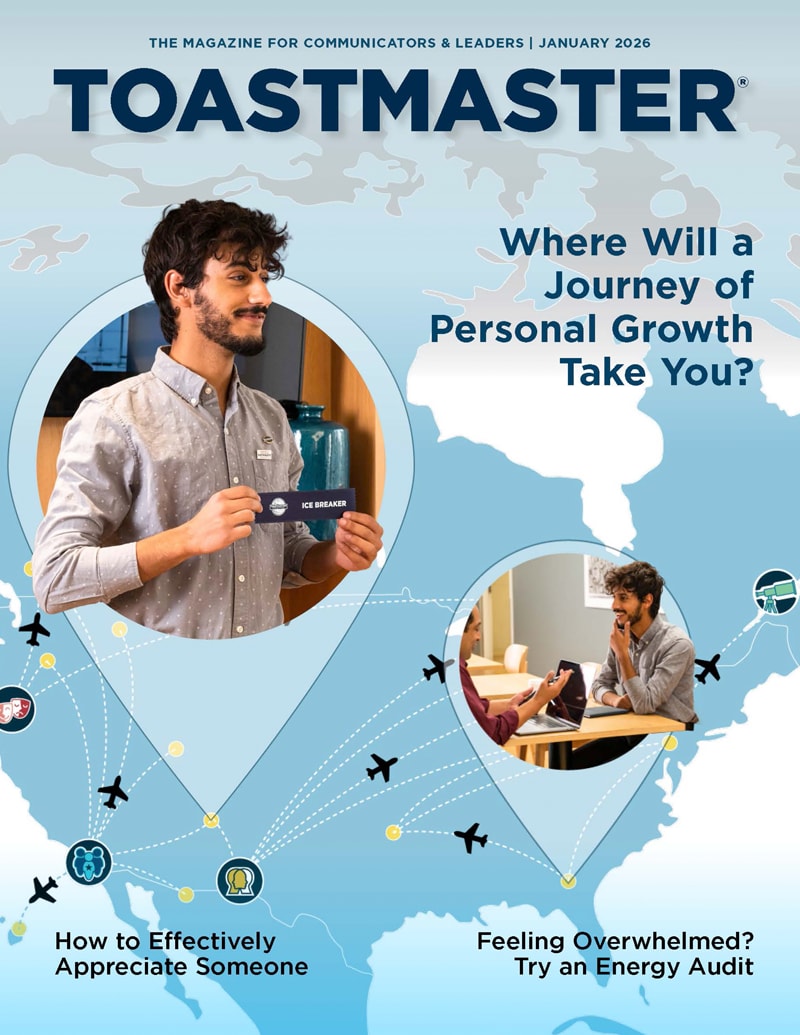
“The value of the Toastmasters leadership program is that you have the opportunity to put it into practice,” says Innocent Richard Jr., DTM, District 81 Director and member of three clubs in Haiti: Amaryllis Toastmasters Club and Les Pionniers Club Avancé in Port-au-Prince, and Imperial Center Group Club Avancé in Cap-Haitien. “Toastmasters provides appropriate spaces for us to practice, make mistakes, receive feedback, and grow.”
Here are some ways Toastmasters can help you strengthen your leadership skills, whether you have a title or not.
Pathways Projects: The Leadership Development path focuses on managing your time, developing and executing a plan, and leading a team. Another path, Dynamic Leadership, helps you understand leadership and strengthens your conflict-resolution and change-management skills.
However, all 11 paths incorporate leadership development opportunities. Several paths require a High Performance Leadership project (HPL), which involves leading a team to complete an initiative.
Volunteer Leadership Roles: You develop leadership skills and gain experience by serving in club and District roles. You can also chair a speech contest or District conference.
Anna Hyeyoung Lee, DTM, from Chinese English Bilingual Toastmasters in Seoul, South Korea, says she’s learned the most while serving as a past conference chair and now as District 93 Director. “Both roles offer the whole view of the project and the biggest responsibilities,” she says. “They provide learning opportunities in all aspects—recruiting with sharing the vision, planning, executing the plan, handling conflicts, compromising, and getting the best outcome. However, I believe all leadership opportunities, like club officers or committee chairs, also provide learning opportunities.” The only difference may be the size of the projects, she notes.
Richard agrees. “I think members don’t value roles like Toastmaster of the Day and General Evaluator enough. For me, these are the very basis of the leadership program.”
Other opportunities include organizing a Speechcraft or Youth Leadership Program in your community. Both are condensed versions of the Toastmasters meeting experience for non-members.
Mentors: You can find a mentor to help you talk through leadership challenges you’re facing and how to avoid pitfalls. Or you can ask someone you admire. Or ask your Vice President Education to connect you to District leadership, where you can connect with Toastmasters outside your club who have the experience you’re seeking.
You can learn from others informally by observing and asking questions. “In Toastmasters, we have many examples of leaders,” says Lee. “As we communicate with them, we will understand different leadership styles. We can also find our own leadership style and keep developing it.”
Participating in Toastmasters will also help you increase self-awareness and strengthen communication skills, two key aspects of leadership. The entire Toastmasters program offers myriad ways to gain experience, boost confidence, and develop into the leader you want to be.
Lee says she didn’t fully understand the opportunity Toastmasters provides until she was a District-level volunteer. “I was able to see myself learning, growing, handling conflict better, and overall becoming a better me,” she says. “I started to take bigger challenges to develop my skills. Because I know there is only one way to make yourself a better leader—by doing it.”
Jennifer L Blanck, DTM has more than 25 years of career development and advising experience. She is a member of 5-Star Toastmasters Club in Arlington, Virginia, and AAMC Toastmasters in Washington, D.C., as well as a regular contributor to the Toastmaster magazine. Learn more at jenniferlblanck.com



 Previous
Previous
 Previous Article
Previous Article